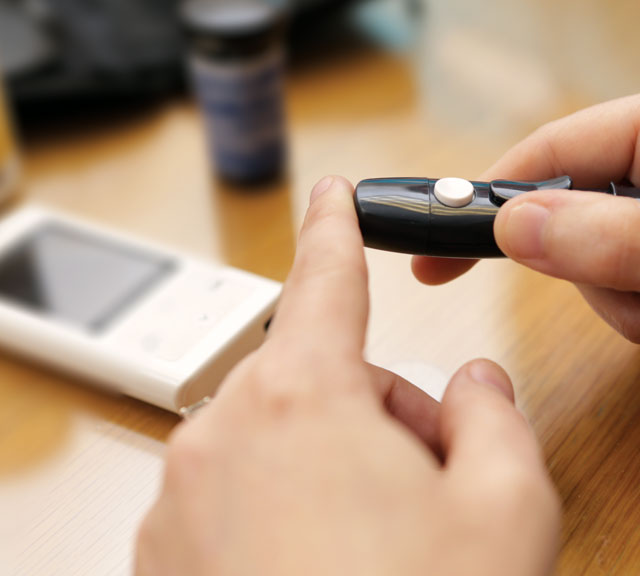Beat Hypoglycemia Using Your Diabetes Smarts

Find Your Perfect Match
Answer a few questions and we'll provide you with a list of primary care providers that best fit your needs.
Could an insulin reaction brought on by low blood sugar happen to you?
Managing diabetes includes carefully monitoring your food intake—both what you eat and how often you eat — and, typically, taking medicine such as insulin to help regulate the amount of glucose in your blood and keep it within a healthy target range. The usual recommended blood sugar range is between 70 and 99 mg/dl — that is, between 70 and 99 milligrams of glucose for every deciliter of blood.
If you've missed a meal or taken too much insulin, your glucose level can drop too far below the target range, creating hypoglycemia, or low blood sugar. Most commonly a side effect of diabetes management, hypoglycemia (also called an insulin reaction or insulin shock) is a serious health risk and should be dealt with immediately.
What Are the Symptoms of Hypoglycemia?
In people who are prone to it, hypoglycemia can come on quickly. When the blood sugar drops below the target range, symptoms can include:
- Shakiness or dizziness
- Feeling hungry
- Sweating, nausea, clammy skin
- Headache
- Irritability or confusion
- Nightmares, night sweats, disorientation after waking
- Mood changes
- Clumsy or uncoordinated movements
- Tingling in the lips or tongue
- Blurry vision
- Fast heartbeat
- Seizures
- Unconsciousness
If not treated, the symptoms of hypoglycemia can worsen, and severe hypoglycemia can lead to coma and even death.
In people who are prone to it, hypoglycemia can come on quickly.
How Is Hypoglycemia Diagnosed and Treated?
If you've not been diagnosed with diabetes, your doctor will study your medical history, perform a complete physical exam and order blood tests to determine the cause of your low blood sugar. If you're already under treatment for diabetes, instances of hypoglycemia will most likely be diagnosed as a complication related to the management of your diabetes. You should handle those episodes of low blood sugar as you've been advised by your doctor.
Treatment plans will typically address both immediate steps and long-term prevention strategies.
Immediate steps: Check your blood sugar level. If it's below your target range, you'll need to get a boost of sugar (15 to 20 grams) into your bloodstream quickly. For example:

- Three or four glucose tablets
- Half a cup of fruit juice or non-diet soda
- One cup of fat-free milk
- A tablespoon of honey, sugar or corn syrup
After consuming the sugar, wait 15 minutes, then check your blood sugar again. If it's still too low, eat or drink another 15-20 grams of sugar and re-test again in 15 minutes. If this doesn't resolve the problem, contact your health care provider or seek emergency care. Ask your doctor if you should keep a glucagon emergency kit handy.
Prevention strategies: Careful management of your diabetes can help you recognize and deal with occasional episodes of low blood sugar, so you can nip them in the bud. Good diabetes management includes:
- Keeping a close eye on your blood sugar levels: Work with your health care provider to make sure you know how, and how often, to check your blood glucose levels.
- Working your meal plan: A dietitian can help you develop an eating plan that takes into consideration your daily activities, your medication schedule and your personal preferences.
- Matching your meals and medicine: Your eating schedule and the timing of your medication doses need to be in good coordination, to help ensure that you're maintaining a healthy balance of glucose and insulin in your bloodstream.
- Monitoring your physical activity: Since physical activity can lower your blood glucose, it's important to stay aware and check your blood sugar levels more frequently when you're involved in physical activity so that you can take steps to adjust any imbalance as soon as possible.
Get the Word Out
If hypoglycemia is an ongoing problem for you, it's important to let others know, in case you are ever incapacitated and unable to help yourself. To help spread the word:
- Wear a medical alert bracelet or pendant or carry a medical ID card that lets others know you have diabetes and tells them what to do if you have a seizure or are unconscious.
- Educate your family, friends, and colleagues about the signs of hypoglycemia and how to help you if you can't help yourself.
Knowledge is Power
Talk with your doctor or health care provider to make sure you understand the ins and outs of dealing with low blood sugar in your specific case. They can offer information and strategies that can help you manage your diabetes, reduce the risk of hypoglycemic episodes and stay safe.
Find Your Perfect Match
Answer a few questions and we'll provide you with a list of primary care providers that best fit your needs.
Source: American Diabetes Association; National Institute of Diabetes and Digestive and Kidney Diseases; Medline Plus




